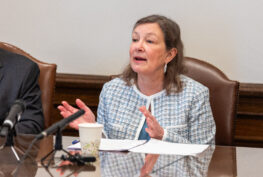Dear friends and neighbors,
Over the past few months, you may have heard conflicting information about Washington’s budget situation. I want to take a moment to explain how we got here.
The current challenges stem from a combination of economic shifts, rising costs, and a tax system that struggles to keep pace with the needs of our growing state.
Washington’s tax system relies heavily on sales taxes, which fluctuate with consumer spending. Recent revenue forecasts have come in lower than expected, making it harder to sustain critical services. We’re one of 40 states that saw revenues decline in 2024. We also have a tax system that relies on low- and middle-income families paying a larger share of their income than the wealthiest households. This imbalance makes long-term budget stability more challenging, even with a strong economy.
Meanwhile, the cost of essential services continues to rise. Inflation and population growth have driven up the price of health care, education, and housing assistance. More Washingtonians than ever rely on these programs, increasing caseloads in early learning, long-term care, and financial aid for students pursuing higher education. These aren’t new programs; these are more people needing support.
Adding to these pressures, emergency federal aid that helped Washington through the worst of the pandemic has expired, shifting costs back to the state. Uncertainty at the federal level — particularly around infrastructure investments, health care funding, and public benefits — has also made planning for the future extraordinarily difficult.
Senate budget writers have been carefully reviewing all options for reductions, and we recognize some cuts are necessary. However, reductions alone will not allow us to sustain the services Washingtonians rely on. A budget built solely on cuts would cause deep harm to public schools, health care, and housing support — services that keep communities stable and thriving. We still feel the damaging impacts of the all-cuts budgets of the Great Recession.
That’s why we must take a balanced approach, one that includes both responsible reductions and new progressive revenue options. If not, Washington will face increasingly difficult choices that could jeopardize the programs families depend on. A responsible budget must ensure long-term stability, not just short-term fixes. That means building a more sustainable tax system that doesn’t force us into a cycle of shortfalls and deep cuts year after year.
While we may have different ideas on how to address these challenges, Washington’s budgeting process has consistently been bipartisan in the Senate — many of my Republican colleagues helped craft and ultimately voted for our final budgets in 2023 and 2024. We continue to collaborate this year.
As chair of the Ways & Means Committee, it is my duty to put forward a balanced budget that protects core services, reflects our shared values, and ensures long-term financial stability. Washingtonians deserve a government that is functional and responsive, especially in uncertain times.
Stay tuned for more updates, and as always, please reach out with any questions or concerns.
Sincerely,
Sen. June Robinson


